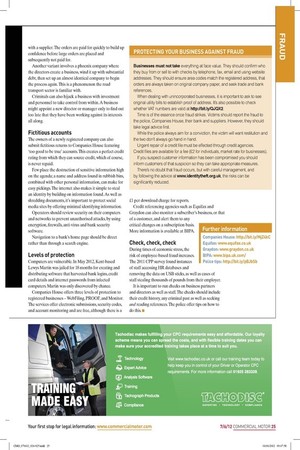PROTECTING YOUR BUSINESS AGAINST FRAUD
Page 18

If you've noticed an error in this article please click here to report it so we can fix it.
Businesses must not take everything at face value. They should confirm who they buy from or sell to with checks by telephone, fax, email and using website addresses. They should ensure area codes match the registered address, that orders are always taken on original company paper, and seek trade and bank references.
When dealing with unincorporated businesses, it is important to ask to see original utility bills to establish proof of address. It’s also possible to check whether VAT numbers are valid at http://bit.ly/QJQX2.
Time is of the essence once fraud strikes. Victims should report the fraud to the police, Companies House, their bank and suppliers. However, they should take legal advice first.
While the police always aim for a conviction, the victim will want restitution and the two don’t always go hand in hand.
Urgent repair of a credit file must be effected through credit agencies.
Credit files are available for a fee (£2 for individuals, market rate for businesses).
If you suspect customer information has been compromised you should inform customers of that suspicion so they can take appropriate measures.
There’s no doubt that fraud occurs, but with careful management, and by following the advice at www.identitytheft.org.uk, the risks can be significantly reduced.











































